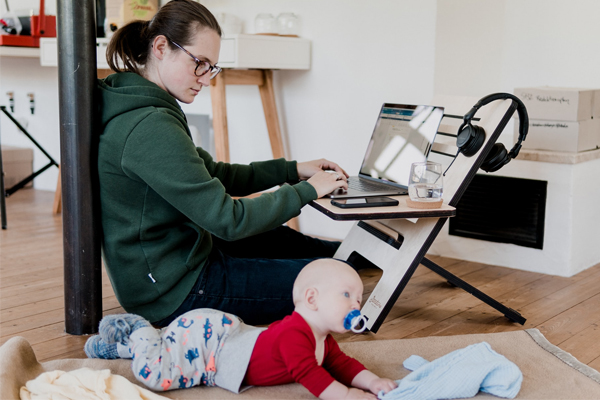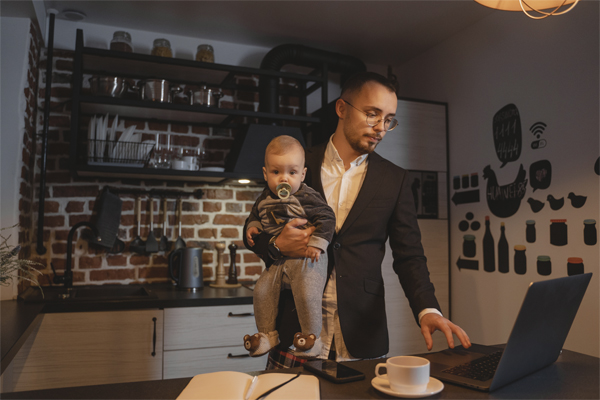Many working mums still feel that they are forced to limit their careers as a result of their employer’s inflexible and outdated working policies and cultures, new research has revealed.
The study titled The Shift from Worker to Working Parent, carried out by WOMBA (Work, Me and the Baby), an organisational and executive coaching practice, and Hult International Business School (Ashridge), interviewed working mums and dads who had recently taken extended parental leave about the experiences they faced as they transitioned to parenthood in an organisational context.
Many of the mums interviewed said they felt forced to choose between being a mother over having a successful career. For mums who had to make tough decisions about their work-home balance, many felt they could not push back against their employer and had no choice but to accept the conditions presented to them, such as working full-time hours or in the office.
“Too often, working mums are forced to make the tough choice between career and caring because they’ve been denied flexible working, decent parental leave and affordable childcare,” shared Helen Sachdev, Director of WOMBA. “In fact, 84% of the 1.75 million people who’ve given up work to care for their family are women. The barriers facing mums and dads as they transition from worker to working parent are ones that threaten decades of progress on gender equality.”

MUMS CONCEALING PARENTAL IDENTITY
Working mothers are also concealing parental identity at work through fear of judgement, the survey found. The research suggests that working mums restrict the identity they share in the workplace to minimise the negative impact on their career.
Despite understanding the importance of bringing one’s whole self to work, several mums described the need or want to conceal their parenting identity and the parenting challenges they face through fear of being judged negatively, for example as incompetent or incapable. “There’s a perception that I’ve gone from being someone who really cared and was good at work to someone who doesn’t care. And that’s really not true,” shared one of the mums interviewed. “I love my job”.
All mums interviewed shared the importance and challenge of trying to balance the identity of a working mum and a parent. One mum said she keeps her camera off during remote meetings because she fears being perceived as disengaged from work. Another mum worried about the need to prove that she can do everything and be a ‘supermum’.
CHALLENGING INADEQUATE POLICIES & PIONEERING CHANGE
Unlike mums, the research revealed that most dads did not have to choose between career and parenthood, instead feeling the two could co-exist. When dads did face barriers in their transition to parenthood, they felt able to speak up and push back against their employer until they achieved the outcome they needed or wanted.
The study found that dads frequently challenged the formal HR system and inadequate parental leave policies to negotiate paid time off and the flexibility they need with childcare. An approach in direct contrast to mums who were more likely to adhere to rules and persist with dealing formally with HR.

In many ways, the research suggests dads have taken on a pioneering role, with many being the first they knew to take extended parental leave. Many dads feel they have become role models for others in their organisation. One dad said: “For the majority, it’s my generation who are leading this… we will be the role models in the future.”
The study also showed that dads did not have to think too much about how much of their fatherhood identity to share in the workplace. In comparison to mums, dads found their new parental identity was a benefit, often being praised, and in some cases, seen as a hero by colleagues when they took parental leave or adopted a flexible way of working to care for their children.
UNEQUAL SHARED PARENTAL LEAVE
“The disconnect between policy and practice is only adding to the inequality. For example, in 2019/2020 – and in its fifth year – only 3.6% of eligible fathers took Shared Parental Leave (SPL). As well as offering immediate and equal support for working mums and dads, employers must create a culture where parents feel they can use the arrangements, to ensure the responsibility of childcare can be shared and both parents can continue to manage their careers,” highlighted Sachdev.
“Whilst there is no shortage of media coverage of the challenges working parents face, there is very limited academic research in this area, particularly in the UK, or including working fathers,” added Dr Carina Paine Schofield, senior research fellow at Hult International Business School (Ashridge). “Our research explores how parents’ (mothers and fathers) experience the transition to parenthood in an organisational context.
This study, listening to working mothers and working fathers’ stories, is just the start of this research journey. ”We want to ensure that the voices of both parents are heard by managers, leaders and organisations, to ensure that they can be retained and supported in the workplace,” added Schofield.





































